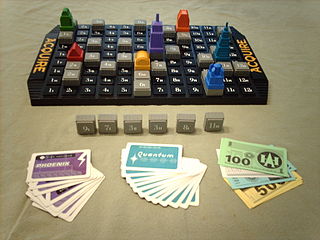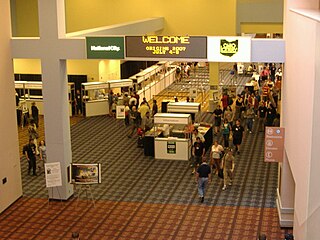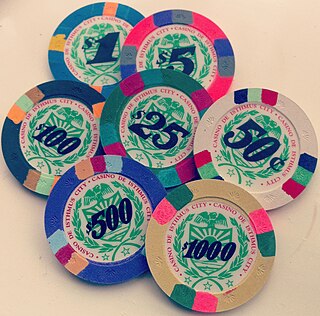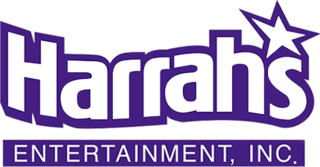
Acquire is a board game published by 3M in 1964 that involves multi-player mergers and acquisitions. It was one of the most popular games in the 3M Bookshelf games series published in the 1960s, and the only one still published in the United States.

A casino is a facility for certain types of gambling. Casinos are often built near or combined with hotels, resorts, restaurants, retail shops, cruise ships, and other tourist attractions. Some casinos are also known for hosting live entertainment, such as stand-up comedy, concerts, and sports.

Avalon Hill Games Inc. is a game company that publishes wargames and strategic board games. It has also published miniature wargaming rules, role-playing games and sports simulations. It is a subsidiary of Hasbro, and operates under the company's "Hasbro Gaming" division.

Texas hold 'em is one of the most popular variants of the card game of poker. Two cards, known as hole cards, are dealt face down to each player, and then five community cards are dealt face up in three stages. The stages consist of a series of three cards, later an additional single card, and a final card. Each player seeks the best five-card poker hand from any combination of the seven cards: the five community cards and their two hole cards. Players have betting options to check, call, raise, or fold. Rounds of betting take place before the flop is dealt and after each subsequent deal. The player who has the best hand and has not folded by the end of all betting rounds wins all of the money bet for the hand, known as the pot. In certain situations, a "split pot" or "tie" can occur when two players have hands of equivalent value. This is also called "chop the pot". Texas hold 'em is also the H game featured in HORSE and HOSE.

Origins Game Fair is an annual gaming convention that was first held in 1975. Since 1996, it has been held in Columbus, Ohio at the Greater Columbus Convention Center. Origins is run by the Game Manufacturers Association (GAMA). Origins was chartered to serve gaming in general, including wargaming and miniatures gaming.

Casino chips are small discs used as currency in casinos. Larger, rectangular gaming plaques may be used for high-stakes games. Poker chips are also widely used as play money in casual or tournament games, are of numismatic value to casino chip collectors, or may be kept as souvenirs.

Harrah's Entertainment was an American casino and hotel company founded in Reno, Nevada, and based in Paradise, Nevada, that operated over 50 properties and seven golf courses under several brands. In 2013, it was the fourth-largest gambling company in the world, with annual revenues of $8.6 billion. It was acquired in 2020 by Eldorado Resorts, which then changed its own name to Caesars Entertainment.

HeroQuest, is an adventure board game created by Milton Bradley in conjunction with the British company Games Workshop in 1989, and re-released in 2021. The game is loosely based around archetypes of fantasy role-playing games: the game itself was actually a game system, allowing the gamemaster to create dungeons of their own design using the provided game board, tiles, furnishings and figures. The game manual describes Morcar/Zargon as a former apprentice of Mentor, and the parchment text is read aloud from Mentor's perspective. Several expansions have been released, each adding new tiles, traps, artifacts, and monsters to the core system.

History of the World is a board game designed by Ragnar Brothers and originally published in 1991. It is played by up to six players across various epochs, each player playing a different empire every round to have the greatest score at the end of the game by conquering other players' regions of the board.

The Golden Gate Hotel & Casino is located at One Fremont Street in Las Vegas, Nevada, United States. A part of the Fremont Street Experience, it is the oldest and smallest hotel on the Fremont Street Experience.
Betrayal at House on the Hill is a board game published by Avalon Hill in 2004, designed by Bruce Glassco and developed by Rob Daviau, Bill McQuillan, Mike Selinker, and Teeuwynn Woodruff. Players all begin as allies exploring a haunted house filled with dangers, traps, items, and omens. As players journey to new parts of the mansion, room tiles are chosen at random and placed on the game board; this means that the game is different each session. Eventually the "haunt" begins, with the nature and plot of this session's ghost story revealed; one player usually "betrays" the others and takes the side of the ghosts, monsters, or other enemies, while the remaining players collaborate to defeat them.

Binion's Gambling Hall & Hotel, formerly Binion's Horseshoe, is a casino on Fremont Street along the Fremont Street Experience pedestrian mall in Downtown Las Vegas, Nevada, United States. It is owned by TLC Casino Enterprises. The casino is named for its founder, Benny Binion, whose family ran it from its founding in 1951 until 2004. The hotel, which had 366 rooms, closed in 2009. TLC reopened 81 of the rooms as a boutique hotel called Hotel Apache in July 2019.

Dune is a strategy board game set in Frank Herbert's Dune universe, published by Avalon Hill in 1979. The game was designed by Bill Eberle, Jack Kittredge and Peter Olotka. After many years out of print, the game was reissued by Gale Force Nine in 2019 in advance of the 2021 Dune film adaptation.

The Princes of Florence is a German board game designed by Wolfgang Kramer and Richard Ulrich published in 2000 by Alea in German and by Rio Grande Games in English. Players assume the roles of Florentine Princes who wish to design their own villas to allow artists to create great works of prestige. Through seven rounds, each containing an auction phase and two action phases, the Princes pay for landscaping, buildings, freedoms, and various services and bonuses. At the end of the seven rounds, whoever has the most Prestige Points wins.

Conquistador, originally subtitled "The Age of Exploration: 1495–1600", is a board game published by Simulations Publications, Inc. (SPI) in 1976 that simulates the exploration of the New World in the 16th century. Players take on the role of European countries sending expeditions to find gold and establish colonies. Although the design uses the trappings of board wargames such as a hex map, combat is not a major part of the game.

Britannia is a strategy board game, first released and published in 1986 by Gibsons Games in the United Kingdom, and The Avalon Hill Game Company in 1987 in the United States, and most recently updated in late 2008 as a re-release of the 2005 edition, produced by Fantasy Flight Games. It broadly depicts the wars in, and migrations to, the island of Great Britain in the centuries from the Roman invasions to the Norman Conquest.

Cyberpunk: The Collectible Card Game, also known as Cyberpunk, the CCG and Cyberpunk CCG, is an out-of-print collectible card game designed by Peter J. Wacks, based on R. Talsorian Games' dystopian near-future role-playing game Cyberpunk 2020.

Las Vegas is a board game designed by Rüdiger Dorn and published by Ravensburger in 2012. It is named after the city of Las Vegas in Nevada, United States and has a gambling theme. The game was also nominated for the Spiel des Jahres prize in 2012.
Dead of Winter is a semi-cooperative survival strategy board game for two to five players designed by Jonathan Gilmour and Isaac Vega through Plaid Hat Games. The game is set in a post-apocalyptic, zombie-infested colony. Players are faction leaders who must work together to ensure the colony's survival through incoming zombies and lack of supplies. In addition, players have individual, secret win conditions that they must meet to be victorious.


















